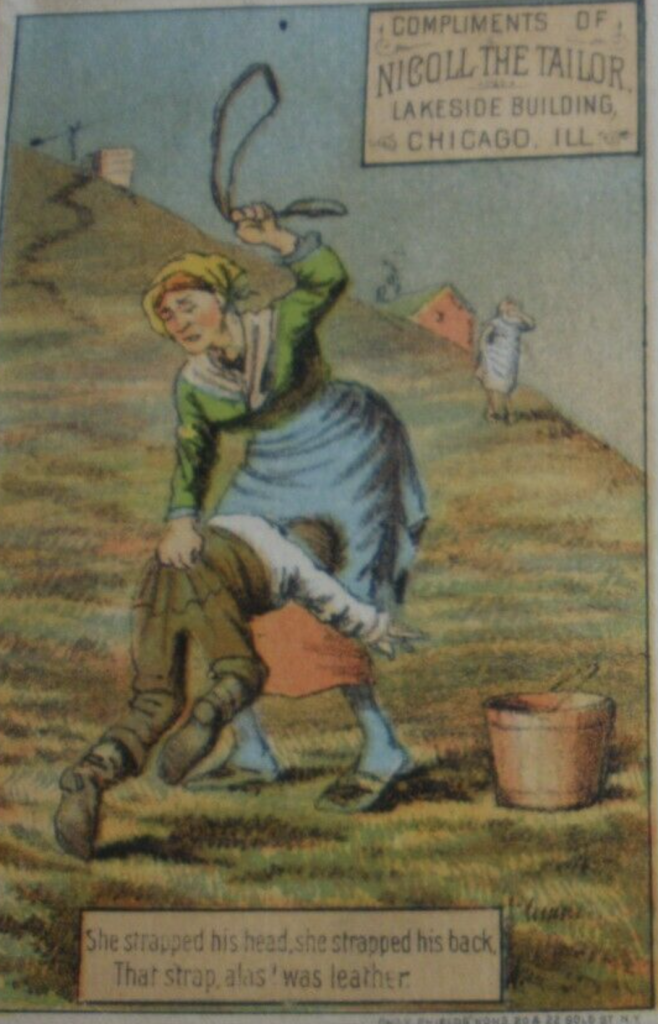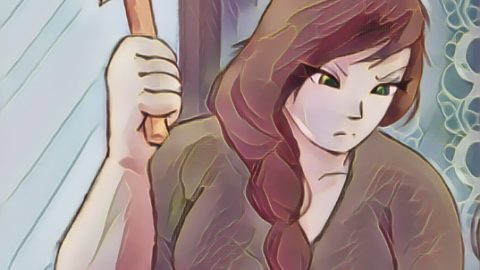(short pause) Greggory was not a bad kid, just a little hyperactive and misunderstood, which in the late 1960s did not go down well in society. His mother always tried to keep him clean and tidy, but no matter what she did, Greggory would always end up in a mess of some kind. That week, my cousin was in rare form. He was loud, brash, and seemed determined to test the patience of every adult in the house. He snapped at our grandmother, rolled his eyes at our uncle, and even tried to boss me around. The tension in the air was almost tangible, and I remember feeling both embarrassed and fascinated by his boldness. Aunt Patricia, however, watched him with a calm, steady gaze, her lips pressed into a thin line as she wiped her hands on her apron.
(pause) But as the week wore on, I began to notice a change in Aunt Patricia. At first, it was subtle—a forgotten teacup here, a distracted look there. She would hum a tune one moment, then suddenly stop and stare out the window, lost in thought. Her laughter, once warm and infectious, became sharper, almost brittle, and her jokes sometimes landed with an edge that made the adults exchange uneasy glances. She would scold Greggory for muddy shoes, then moments later, ruffle his hair and offer him a biscuit as if nothing had happened. Her moods seemed to shift with the wind: one afternoon she was bustling about, singing as she baked a cake, and the next she was sitting at the kitchen table, head in her hands, sighing deeply as if the weight of the world rested on her shoulders.
(short pause) The unpredictability seeped into every corner of the house. Aunt Patricia would start a story at dinner, only to trail off mid-sentence, her eyes clouding over. She would snap at Greggory for the smallest infraction, then apologize with a tight hug and a whispered promise that she was just tired. Sometimes, she would disappear into the garden for long stretches, returning with grass stains on her dress and a faraway look in her eyes. Even her discipline became more erratic—one day she would let Greggory’s mischief slide with a warning, the next she would threaten the leather strap for a minor squabble. The adults tried to smooth things over, but the children felt the tension, the sense that something was off-kilter.
(pause) Aunt Patricia’s approach to raising Greggory was a blend of gentle encouragement and, when that failed, firm discipline. She wanted nothing more than for her son to grow up with manners and respect, to be the kind of man his father perhaps was not. If Greggory Junior’s antics crossed the line, Aunt Patricia would try to reason with him first, her voice soft but insistent. But if that didn’t work, she had another method—one that was well-known in the family. The infamous leather strap, a well-worn relic that had kept generations of children in line, was always within reach. Aunt Patricia believed in its power to drive her message home, and though she never used it in anger, its presence was enough to keep most mischief in check.
(pause) Finally, after one particularly rude outburst at the dinner table, Aunt Patricia set down her fork and fixed Greggory with a look that could freeze water. “That’s it,” she said, her voice low but firm. “We’re gonna have a little talk.” The room fell silent. Greggory’s bravado melted away as she took him gently but firmly by the arm and led him outside, closing the door behind them. The rest of us sat in awkward silence for a moment, then, as if on cue, the adults resumed their conversation, laughter bubbling up again, trying to fill the uneasy gap.
(short pause) I remember peeking out the window, catching a glimpse of Aunt Patricia and Greggory standing beneath the old apple tree in the garden. She spoke to him quietly, her face serious, while he stared at the ground, scuffing his shoe in the dirt. After a few minutes, Aunt Patricia returned to the kitchen, her expression unreadable. Greggory followed a little later, his eyes red and puffy from crying. He stood in the doorway, hesitated, then mumbled a tearful apology to everyone in the room. The adults nodded, accepting his words, and the mood slowly lightened.
(pause) Greggory and I were like two peas in a pod, inseparable and always getting into mischief together. It wasn’t until the next day that I learned what Aunt Patricia’s “little talk” really meant. That morning, Greggory and I got into mischief together—something silly, like sneaking biscuits from the pantry or tracking mud through the hallway. Aunt Patricia caught us red-handed. She didn’t raise her voice, but her disappointment was clear. “I think it’s time for another little talk,” she said, her tone gentle but unyielding.
(dramatic pause) This time, we both followed her, hearts pounding, to the back room—a small, tidy space off the kitchen, with sunlight filtering through lace curtains and the faint scent of lavender in the air. The room felt suddenly colder, the air thick with anticipation and dread. Aunt Patricia closed the door softly behind us, her face composed but resolute. She reached up to the high shelf, retrieving the infamous leather strap—a dark, timeworn piece of leather, its edges softened by years of use. She held it in her hands for a moment, her eyes meeting ours, not with anger, but with a deep, unwavering seriousness.
She spoke quietly, explaining why we were being punished, her words measured and calm. “You both know why you’re here. Actions have consequences, and I want you to remember this lesson.” Her voice was gentle, but there was no mistaking the firmness in her tone. She instructed Greggory to stand in front of her, his shoulders hunched and his lower lip trembling. The room was silent except for the faint ticking of the clock on the wall.
Aunt Patricia guided Greggory to bend over the back of a sturdy wooden chair, her movements careful and deliberate. She placed a reassuring hand on his back, steadying him. Then, with practiced precision, she raised the strap and brought it down across the seat of his trousers. The sound was sharp, echoing in the small room. Greggory gasped, his knuckles white as he gripped the chair. Aunt Patricia delivered several firm, measured strokes—never rushed, never cruel, but each one a clear message. With every swish of the strap, Greggory’s resolve crumbled a little more, until tears spilled down his cheeks and he sobbed openly, the sting of the leather mingling with the sting of shame and regret.
Throughout the process, Aunt Patricia’s demeanor never wavered. She was stern, but not unkind; her eyes glistened with unshed tears of her own, betraying the pain she felt at having to discipline her son. The emotional atmosphere was heavy, thick with sorrow and the weight of lessons learned the hard way. When it was over, she set the strap aside and knelt beside Greggory, gathering him into her arms. She held him close, whispering words of comfort and forgiveness, her embrace warm and enveloping. Greggory clung to her, his sobs slowly quieting as she stroked his hair and promised that tomorrow would be a new day.
(pause) But as the week drew to a close, Aunt Patricia’s moods became even more unpredictable. She would be cheerful and affectionate one moment, then suddenly snap at the smallest provocation. The house felt like it was walking on eggshells, everyone bracing for the next outburst or abrupt change in tone. On the final evening, after a long day of rain that kept us cooped up indoors, Greggory and I grew restless. We started roughhousing in the sitting room, chasing each other around the furniture, our laughter echoing through the house. A vase was knocked over, and a lamp nearly toppled. Aunt Patricia stormed in, her face flushed and her eyes blazing with a wild energy I hadn’t seen before.
(short pause) “Enough!” she shouted, her voice ringing out like a bell. “I’ve had quite enough of this nonsense. Upstairs, both of you. Now.” There was no room for argument. We trudged up the stairs, hearts pounding, knowing we had finally pushed her too far. In the bedroom, Aunt Patricia appeared moments later, slipper in hand—a sturdy, well-worn house slipper that had seen many years of use. She closed the door behind her, her expression set and determined.
(pause) “You both know what’s coming,” she said, her voice trembling with exhaustion and frustration. “Six of the best, each. And then straight to bed.” She made us stand in a line, and one by one, we bent over the end of the bed. The slipper cracked down across our pyjama bottoms—six firm, stinging smacks each, delivered with a brisk efficiency that left no doubt she meant business. Tears pricked my eyes, and Greggory whimpered beside me, but neither of us dared protest. When it was over, Aunt Patricia set the slipper aside, her shoulders slumping as if the fight had gone out of her.
(short pause) She sat on the edge of the bed, gathering us both into her arms. Her voice was softer now, almost pleading. “I’m sorry, darlings. I just want you to learn. I want you to be good boys.” She kissed our foreheads, her own eyes shining with unshed tears, and tucked us in tightly. As she turned out the light and closed the door, I heard her sigh—a long, weary sound that seemed to carry all the sadness and love in the world.
(pause) Looking back, I realize those moments shaped us, teaching us respect, humility, and the enduring power of family. Aunt Patricia’s discipline was firm, but it was always followed by love—a reminder that even in the hardest moments, we were never alone. And though her moods that week were unpredictable, her care for us never wavered, leaving us with memories that would last a lifetime.






